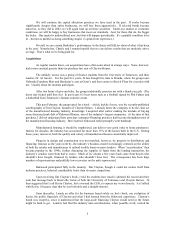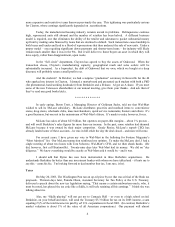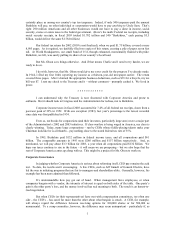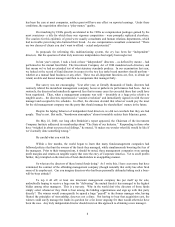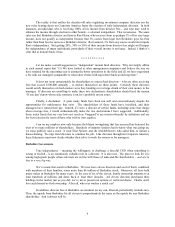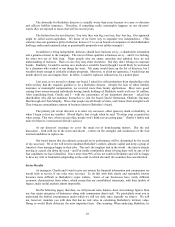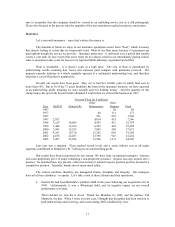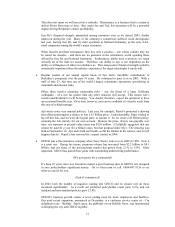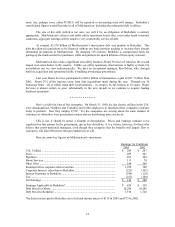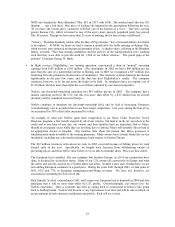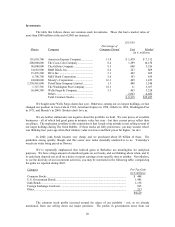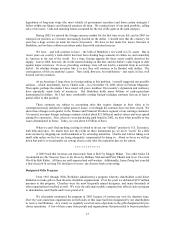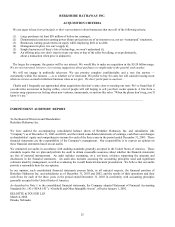Berkshire Hathaway 2003 Annual Report Download - page 16
Download and view the complete annual report
Please find page 16 of the 2003 Berkshire Hathaway annual report below. You can navigate through the pages in the report by either clicking on the pages listed below, or by using the keyword search tool below to find specific information within the annual report.15
Finance and Financial Products
This sector includes a wide-ranging group of activities. Here’ s some commentary on the most
important.
• I manage a few opportunistic strategies in AAA fixed-income securities that have been quite
profitable in the last few years. These opportunities come and go – and at present, they are
going. We sped their departure somewhat last year, thereby realizing 24% of the capital gains
we show in the table that follows.
Though far from foolproof, these transactions involve no credit risk and are conducted in
exceptionally liquid securities. We therefore finance the positions almost entirely with
borrowed money. As the assets are reduced, so also are the borrowings. The smaller
portfolio we now have means that in the near future our earnings in this category will decline
significantly. It was fun while it lasted, and at some point we’ ll get another turn at bat.
• A far less pleasant unwinding operation is taking place at Gen Re Securities, the trading and
derivatives operation we inherited when we purchased General Reinsurance.
When we began to liquidate Gen Re Securities in early 2002, it had 23,218 outstanding tickets
with 884 counterparties (some having names I couldn’ t pronounce, much less
creditworthiness I could evaluate). Since then, the unit’ s managers have been skillful and
diligent in unwinding positions. Yet, at yearend – nearly two years later – we still had 7,580
tickets outstanding with 453 counterparties. (As the country song laments, “How can I miss
you if you won’ t go away?”)
The shrinking of this business has been costly. We’ ve had pre-tax losses of $173 million in
2002 and $99 million in 2003. These losses, it should be noted, came from a portfolio of
contracts that – in full compliance with GAAP – had been regularly marked-to-market with
standard allowances for future credit-loss and administrative costs. Moreover, our liquidation
has taken place both in a benign market – we’ ve had no credit losses of significance – and in
an orderly manner. This is just the opposite of what might be expected if a financial crisis
forced a number of derivatives dealers to cease operations simultaneously.
If our derivatives experience – and the Freddie Mac shenanigans of mind-blowing size and
audacity that were revealed last year – makes you suspicious of accounting in this arena,
consider yourself wised up. No matter how financially sophisticated you are, you can’ t
possibly learn from reading the disclosure documents of a derivatives-intensive company
what risks lurk in its positions. Indeed, the more you know about derivatives, the less you
will feel you can learn from the disclosures normally proffered you. In Darwin’ s words,
“Ignorance more frequently begets confidence than does knowledge.”
* * * * * * * * * * * *
And now it’ s confession time: I’ m sure I could have saved you $100 million or so, pre-tax, if I
had acted more promptly to shut down Gen Re Securities. Both Charlie and I knew at the
time of the General Reinsurance merger that its derivatives business was unattractive.
Reported profits struck us as illusory, and we felt that the business carried sizable risks that
could not effectively be measured or limited. Moreover, we knew that any major problems
the operation might experience would likely correlate with troubles in the financial or
insurance world that would affect Berkshire elsewhere. In other words, if the derivatives
business were ever to need shoring up, it would commandeer the capital and credit of
Berkshire at just the time we could otherwise deploy those resources to huge advantage. (A
historical note: We had just such an experience in 1974 when we were the victim of a major
insurance fraud. We could not determine for some time how much the fraud would ultimately
cost us and therefore kept more funds in cash-equivalents than we normally would have.


